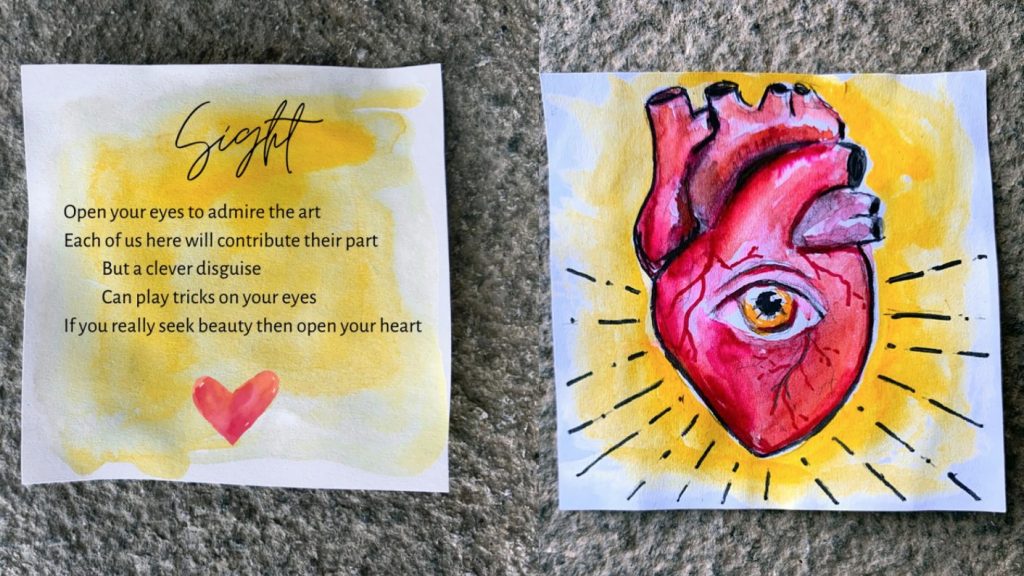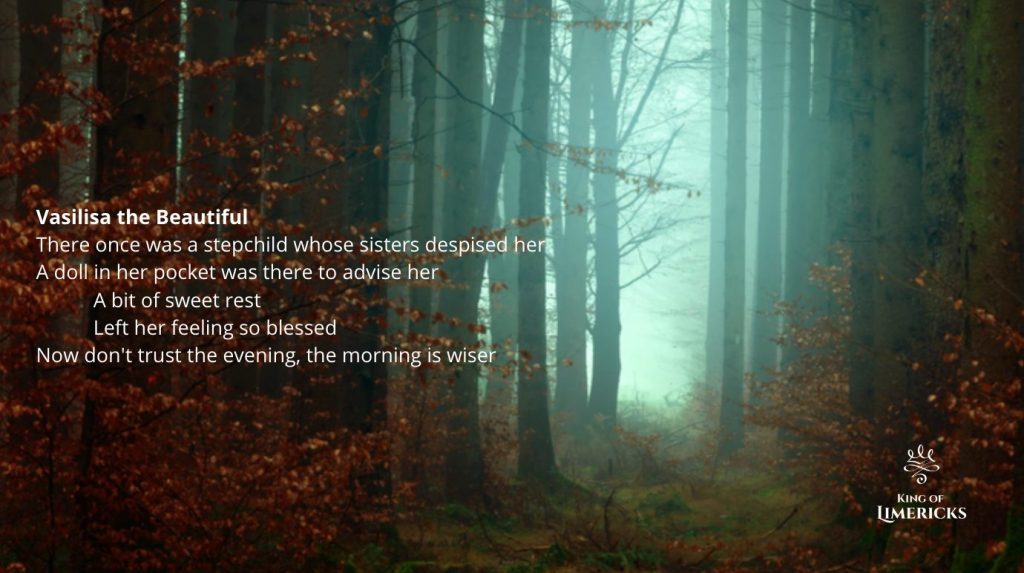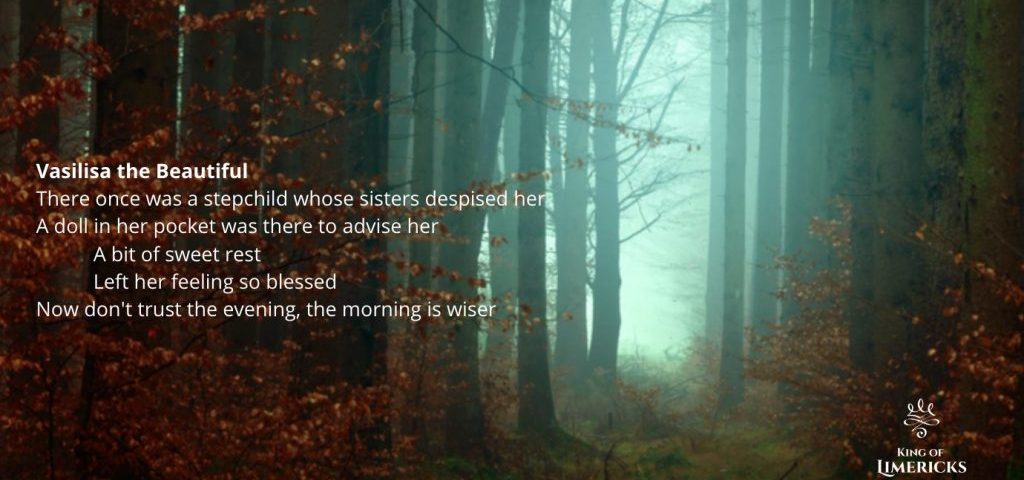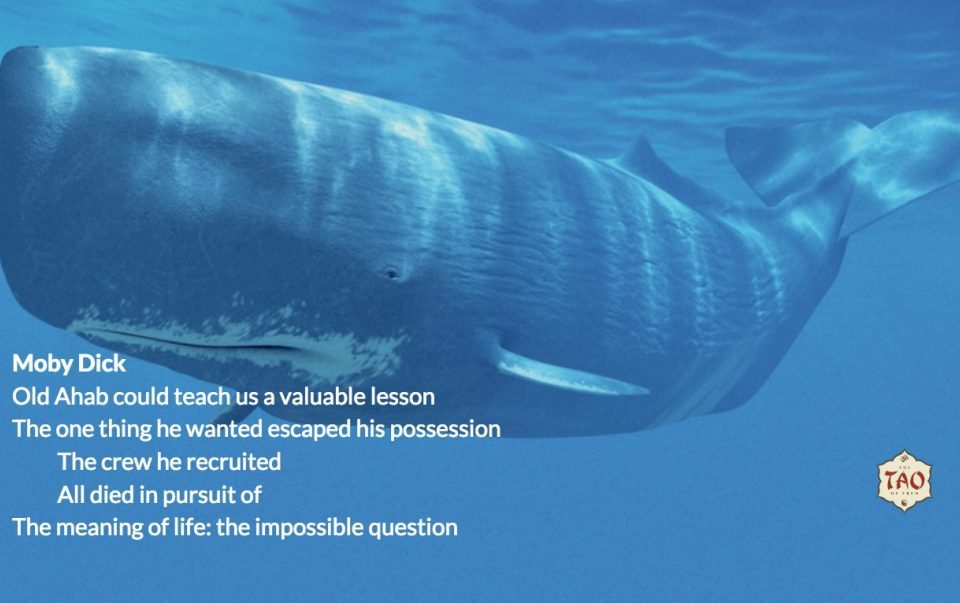
Fantastic Limericks about Science Fiction

Perceptive Limericks about the 5 Senses

The Russians have a somewhat well-known proverb which says that “the morning is wiser than the evening.” You might wonder what that means, or you might figure out the meaning of the proverb on your own. But if you know the fairy tale from which the expression originates, then the message is crystal clear. So where does this instructive proverb come from?
The expression “the morning is wiser than the evening” comes from a Russian fairy tale commonly known as the story of Vasilisa the Beautiful. The story has a similar set-up to the better known tale of Cinderella, from the Brothers Grimm collection. But in this Russian version, the girl has a toy doll who helps her through, often recommending rest, and periodically reminding her that the morning is wiser than the evening.
When you think about it, the idea that the morning is wiser than the evening makes a lot of sense. If you’re like a lot of people, you may have enjoyed your share of late nights, at one time or another, in which you went so far as to engage in some imprudent activities.
At the time, and under the cover of darkness, it may not have seemed like such a bad idea. But the following morning, after recharging the proverbial battery with a good night’s sleep, you could easily recognize the error(s) in your ways.
This scenario suggests an air of late night revelry, and a sense of irresponsibility. But unwise behavior could equally come as a result of simple exhaustion. With heavy eyes, frayed nerves and a weak constitution, it’s not so easy to exercise good judgment.
Real life examples are abundant for most of us, but we can trace the origins of this sage advice, or at least this particular proverb, to a medieval Russian fairy tale which illustrates the situation wonderfully.
The Story of Vasilisa the Beautiful
The lowly stepchild
The fairy tale begins, as many such stories do, with the only daughter of a humble merchant. When the girl, Vasilisa, is just eight years old, her young mother falls victim to one of those dreary diseases of the Middle Ages. On her deathbed she hands her daughter a toy doll. She instructs her to feed and care for the doll, and tells her that the doll will return her kindness with companionship and protection.
Shortly after, the mother dies, and Vasilisa’s father remarries another woman, a widow with with two older daughters. As you might guess, the stepmother does not love Vasilisa the way her real mother did. And the stepsisters make a habit of teasing and belittling the young girl. Not to be discouraged, Vasilisa turns to her doll for affection, feeding it breadcrumbs and milk, and receiving its tenderness in return.
In a typical fashion, Vasilisa ends up bearing the lion’s share of the household chores, as the older stepsisters are not so inclined towards housework. Often overwhelmed with her work, Vasilisa reaches for the doll which she keeps in her pocket. The doll comforts her and tells her not to fret. “Go to sleep now, Vasilisa, and do not worry. I will finish your chores and you will feel fine, for the morning is wiser than the evening.”
The journey to Baba Yaga
Not long after the father remarries, the wicked stepmother convinces him to sell their house in town so that they can move to a cottage in the forest. One day the father is away on business, and the girls, but mostly Vasilisa, are charged with cleaning the cottage. And while doing so, the mother has them put out all the fires in the house, and keep only one candle burning.
But the oldest sister, ever the bully, tricks Vasilisa and blows out the last candle. Naturally, it falls on the young stepdaughter to rekindle the flame, and so the mother sends her off to Baba Yaga to gather fire.
Baba Yaga has an enchanted hut deep in the forest, where she performs all manner of terrifying sorcery, surely enough to scare the wits out of any eight- or nine-year-old child. Arriving at the hut, trembling with fear, Vasilisa finds Baba Yaga’s compound surrounded by skulls and human bones.
Among the many mysteries she witnesses, there are three strange looking horseman who ride by throughout the day. A white horse and horseman go by in the morning, a red horse passes at noon, and she sees a black horseman riding by at dusk. Baba Yaga also has a giant pair of disembodied hands which sometimes appear and help her to prepare the meals.
Duly terrified, the girl turns to her doll for support, and the dolls comforts her with kindness and reassuring words. “Go to sleep now, Vasilisa, and do not worry, for the morning is wiser than the evening.”
In the morning Baba Yaga appears to the girl, and learns of her quest. But in order to obtain fire from the fabled sorcerer, Vasilisa must perform a series of challenging tasks. First she must prepare a delicious meal for the finicky witch. Then she must separate an absurd quantity of corn, sorting out the many rotten kernels. The she must do the same with an enormous mound of black dirt and poppy seeds.
After spelling out the assignment, Baba Yaga asks the girl if she has any questions. She asks about the horses, and Baba Yaga tells her that the white one is the day, the red one is the sun and the black one is the night. Vasilisa wants to ask about the disembodied hands, as well, but the doll in her pocket starts wiggling nervously, and so she decides it would be wiser not to broach the subject.
The completion
When Baba Yaga leaves the hut to go out on her daily errands, Vasilisa gets busy cooking and cleaning. But the supernaturally difficult tasks quickly drives her to exhaustion. Again she brings the doll from her pocket and begins to spill her sorrows.
The doll’s response comes as expected. “Go to sleep now, Vasilisa, and do not worry. I will finish the chores and everything will be fine, for the morning is wiser than the evening.”
Eventually she rises from her slumber, and Baba Yaga returns home soon after. The witch is shocked to see that the tasks have all been finished. Pleased but puzzled, she asks to know how Vasilisa was able to do it.
Smug and satisfied with her work, the girl simply states that she has a blessing from her mother. Baba Yaga can’t stand to have a mortal in possession of a blessing on her property, so she swiftly sends the child away. But not before providing her with some red hot coals and a small flame contained inside a magical skull which serves as a lantern.
When she gets back home to her step family, Vasilisa finds that they had tried to restore the fire on their own. But a curse prevented them from doing so, and they had burned the house to the ground. She finds the bone remains of her stepmother and stepsisters, but finds no sign of her father.
Vasilisa uses the fire from Baba Yaga to destroy their remains and reduce them to ashes. She then buries her skull lantern deep underground so it can never do harm again. She then walks back to town, finds gainful employment as a talented seamstress, rises to a high station, marries a prince and lives happily ever after.
Exposition of the fairy tale
Clearly, the doll in Vasilisa’s pocket represents the child’s inner strength and intuition, and good rest is essential in maintaining that strength. Just like the child in the story, we have to nurture our own inner companion so that it can continue to provide us with strength and wisdom.
The message here is to be faithful to that voice of inner wisdom. Look after it, feed it with psychic energy, and most importantly, pay attention to it. The inner companion advises us to take care of ourselves, by getting a good night’s sleep. Our conscious, rational minds perform so much better when we are not tired, anxious and frustrated, and so do our physical bodies.
Not only that, but as we sleep, the voice of the unconscious has even greater opportunity to impart its mysterious wisdom, by way of dreams. Like the horses who pass by Baba Yaga’s hut, the wisdom of the day and the wisdom of the night must ride in succession in order to complete the cycle. When the conscious and the unconscious work together, the hero can prevail with just a modicum of magic.
And of course, when I long to connect the reins of my conscious with the bridle of my unconscious, I just go out and ride a limerick.
Vasilisa the Beautiful
There once was a stepchild whose sisters despised her
A doll in her pocket was there to advise her
A bit of sweet rest
Left her feeling so blessed
Now don’t trust the evening, the morning is wiser
Further Reading
If you enjoyed this Russian proverb and fairy tale, let me know in the comments section. And please consider sharing the post or subscribing to the blog. You might also want to check out some of these stimulating articles:




